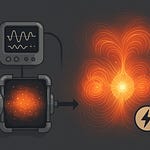TL;DR: The image shows a CGI concept of a humanoid robot with a transparent artificial womb. There is no verified, human-capable “pregnancy robot” today. If anyone tries, Frequency Wave Theory (FWT) says success or failure will hinge on maintaining the fetus–placenta–womb as a coherent resonant system—not just plumbing and nutrients. In FWT terms you must conserve Frequency Momentum (FM), match mechanical/EM phase, and recreate the mother’s multiband vibrational envelope. That yields a concrete, testable blueprint for an artificial gestation platform—and a list of red-flag risks if those fields are ignored.
What you’re looking at (image reality check)
A stylized render of a robot torso with a fetus in a clear “amniotic dome.” It’s a concept illustration, not evidence of a working device. Real-world progress in ectogenesis is limited to short-stage ex-utero support (animal models; preterm support) and in-vitro embryo culture windows under strict rules. No lab has demonstrated full human gestation in a machine, and human trials would face heavy legal and ethical barriers.
The FWT core: a fetus is a resonance problem, not a plumbing problem
FWT treats living systems as embedded standing-wave structures inside a quantum-acoustic superfluid background. The womb is a tunable cavity that couples fluid mechanics, bio-electromagnetism, and mechanical micro-rhythms (heartbeat, respiration, uterine slow waves).
Frequency Momentum:
FM = ½ ρ ω A². Healthy development requires stable FM budgets across bands—from millihertz uterine waves to kilohertz microtubule/ion-channel activity.Phase coupling: Nonlocal/long-range coherence is represented by
P(x,t) = exp{i[φ_local − φ_remote]}. In plain English: the fetus stays phase-locked to the mother’s rhythms (cardiac, circadian, EM micro-fields, even voice).Continuity:
∂_t FM + ∇·S_FM = 0, withS_FM = FM · v_phase. Disruptions (pumps, alarms, jarring sound, harsh light) bleed FM and decohere development.
Implication: An artificial womb must not just circulate blood analogs and oxygen. It must recreate the spectral, phase-locked field ecology of a mother.
FWT design blueprint for an artificial gestation platform
Think of this as a Resonant Gestation Engine—a set of subsystems whose job is to keep FM conserved and phases aligned.
Amniotic Field Module (AFM)
Tunable fluid with matched density/viscosity and acoustic impedance to human amniotic fluid.
Closed-loop spectral shaper drives sub-Hz to ~200 Hz micro-vibrations that mimic maternal heartbeat (≈1–2 Hz), respiration (~0.2–0.4 Hz), and uterine slow waves (~0.05–0.1 Hz).
Control target: keep integrated FM (0.01–200 Hz) within maternal envelopes ±10%.
Placental Exchange & Pulsatile Perfusion (PEP)
Microfluidic oxygenation and nutrient exchange with pulsed (not steady) flow to preserve shear-stress rhythms seen in real cord/placenta.
Drive law: perfusion pulses shaped so that the power spectral density of wall shear matches in-utero recordings; avoid DC-dominant flows that flatten endothelial signaling.
Electromagnetic Hygiene & Coherence (EMHC)
Low-amplitude, broadband EM background matching maternal tissues (ELF/ULF) plus strict shielding from switching supplies.
Phase-lock controller minimizes
|φ_artificial − φ_maternal|in the ELF band. (This isP(x,t)in action.)Hard limits on RF transients; no PWM at fetal-brain harmonics.
Maternal Proxy Coupler (MPC)
Wearables on the mother (or chosen caregiver) stream heartbeat, respiration, voice, gait micro-shakes, and circadian light cues to the chamber in real time.
Voice and bone-conducted spectra are injected through the fluid as near-field vibrations rather than loudspeaker air sound.
Photonic Circadian Engine (PCE)
Light scheduling mimics uterine red/IR bias (through tissue) with gradual 24-h cycles, not abrupt blue spikes.
Near-IR (safe intensities) supports mitochondrial rhythms; no “clinical white” lighting.
Immune-Exosome Dial-a-Field (IEDF)
Maternal serum/exosome library (screened) delivered on circadian and gestational phase schedules. The “when” matters as much as the “what.”
Shock & Startle Guard (SSG)
Inertial sensors cancel external jolts with counter-phase fluid actuation so the fetus experiences smooth, low-jerk motion.
AI Resonance Supervisor (AIRS)
Instead of optimizing “vitals,” AIRS optimizes FM setpoints across bands with multi-objective constraints: oxygenation, shear spectra, acoustic PSD, EM phase error, and stress-hormone proxies.
Safety core runs on formally verified controllers; no black-box autonomy for critical loops.
Minimal test plan (falsifiable, stepwise)
Stage A (animals, late gestation): Demonstrate that FM-matched pulsatile perfusion + acoustic envelope reduces inflammatory markers and improves myelination vs. nutrient-only controls.
Stage B (earlier gestation, animals): Show cortical layer formation and thalamocortical connectivity metrics track in-utero norms when
|Δφ|to maternal streams is minimized.Stage C (preterm human support, not full gestation): Evaluate FM-aware chambers for weeks-long support of extremely preterm infants (22–26 weeks) under existing ethical frameworks.
Key prediction: Systems that conserve FM and phase will outperform nutrient-perfect but spectrally blind devices on neurodevelopmental outcomes.
Where sensational claims go wrong
Steady pumps, sterile silence, harsh light, and EMI are development-hostile in FWT terms: they bleed FM and decohere the fetus from its native phase-locks.
A “robot mom” that ignores resonance is a biological anechoic chamber—it may keep tissue alive while quietly derailing brain, immune, and endocrine development.
Ethics, limits, and a blunt reality check
Full machine gestation of a human embryo to term is not a current clinical reality and would be illegal or unethical in most jurisdictions.
FWT doesn’t grant carte blanche; it tightens requirements: if you cannot reproduce the vibrational ecology with high fidelity, don’t do it.
The near-term, defensible application is FM-aware ex-utero support for extreme prematurity, under transparent oversight and preregistered endpoints.
Bottom line
If a “pregnancy robot” ever works, it won’t be because of glossy mechatronics. It will be because the designers treated gestation as a frequency-coupled resonance system and kept FM = ½ ρ ω A² and P(x,t) aligned with a real mother’s field—moment to moment, band by band. Anything less is tech cosplay with a heartbeat.














Share this post